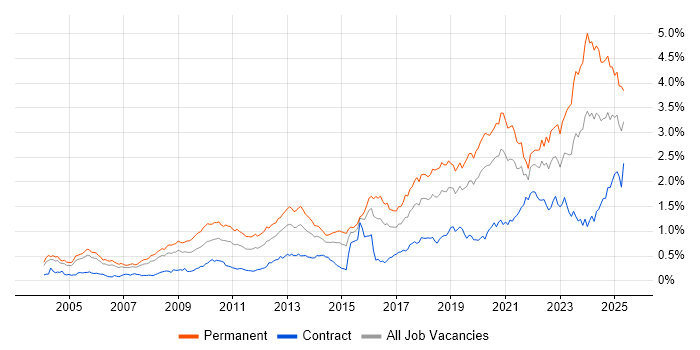Software Engineer
Central London > City of London
The median Software Engineer salary in the City of London is £95,000 per year, according to job vacancies posted during the 6 months leading to 2 March 2026.
The table below compares current salary benchmarking and summary statistics with the previous two years.
|
|
6 months to
2 Mar 2026 |
Same period 2025 |
Same period 2024 |
| Rank |
32 |
54 |
48 |
| Rank change year-on-year |
+22 |
-6 |
+64 |
| Permanent jobs requiring a Software Engineer |
158 |
104 |
150 |
| As % of all permanent jobs in the City of London |
5.47% |
4.37% |
4.81% |
| As % of the Job Titles category |
5.79% |
4.80% |
5.03% |
| Number of salaries quoted |
137 |
88 |
139 |
| 10th Percentile |
£70,000 |
£55,125 |
£56,000 |
| 25th Percentile |
£80,000 |
£56,250 |
£65,000 |
| Median annual salary (50th Percentile) |
£95,000 |
£71,250 |
£82,500 |
| Median % change year-on-year |
+33.33% |
-13.64% |
-2.94% |
| 75th Percentile |
£100,000 |
£93,125 |
£101,250 |
| 90th Percentile |
- |
£115,000 |
£120,000 |
| Central London median annual salary |
£95,000 |
£75,000 |
£82,500 |
| % change year-on-year |
+26.67% |
-9.09% |
-2.65% |
For comparison with the information above, the following table provides summary statistics for all permanent IT job vacancies in the City of London. Most job vacancies include a discernible job title that can be normalized. As such, the figures in the second row provide an indication of the number of permanent jobs in our overall sample.
| Permanent vacancies in the City of London with a recognized job title |
2,728 |
2,167 |
2,982 |
| % of permanent jobs with a recognized job title |
94.43% |
91.09% |
95.70% |
| Number of salaries quoted |
1,987 |
1,470 |
2,625 |
| 10th Percentile |
£42,500 |
£41,250 |
£40,600 |
| 25th Percentile |
£57,500 |
£55,000 |
£53,750 |
| Median annual salary (50th Percentile) |
£77,500 |
£75,000 |
£75,000 |
| Median % change year-on-year |
+3.33% |
- |
- |
| 75th Percentile |
£98,750 |
£95,000 |
£97,500 |
| 90th Percentile |
£100,000 |
£117,500 |
£115,000 |
| Central London median annual salary |
£77,500 |
£72,500 |
£73,000 |
| % change year-on-year |
+6.90% |
-0.68% |
-2.67% |


